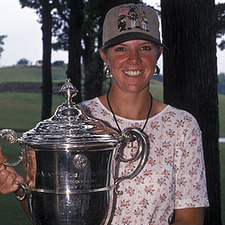It’s quite a feat to win a USGA championship. To capture two or more of them, a golfer falls into a very select group indeed. Narrow that group down to players with strong Colorado ties and it’s really rarefied air.
Hale Irwin, who grew up in Boulder and played college golf and football at the University of Colorado, of course leads the way with his five USGA titles (three U.S. Opens and two U.S. Senior Opens).
Babe Zaharias, who lived in Edgewater, claimed four USGA championships during the 1940s and ’50s. Hollis Stacy won six USGA titles, though they came long before she made Lakewood her part-time residence. Orville Moody, once stationed at Fitzsimons while in the Army, has a U.S. Open and a U.S. Senior Open to his credit. And longtime Colorado Springs resident Barbara McIntire won the second of her U.S. Women’s Amateur titles 50 years ago this year, defeating JoAnne Gunderson (now Carner) for the victory.
Another local, Denver native Jill McGill, is also part of that distinguished company. Twenty years ago this summer, the Cherry Creek High School graduate won the U.S. Women’s Amateur Public Links Championship. (She’s pictured above, in a USGA photo, with the WAPL trophy.) That win came less than a year after McGill claimed the 1993 U.S. Women’s Amateur title.
When The Home Course in Dupont, Wash., hosts the Women’s Publinks next week (July 14-19), it’ll mark the final time the championship is played after a 38-year run. The USGA announced last year that it is discontinuing both the women’s and men’s Publinks tournaments, and adding men’s and women’s four-ball championships.
“I have very mixed emotions” about the Publinks being discontinued, McGill said in a USGA.org Q&A earlier this year. “I believe in recent years, the U.S. Women’s Amateur has really come to the forefront and has emerged as the premier USGA event for female amateurs. But at the same time … public golf is such an important part of the sport of golf in general. There’s also the historical element of it. Winning the WAPL is a great feat and a lot of those champions have gone on to tremendous careers professionally. Anyone who has won an event would be sad to see it go. It’s fun to relive the memory of the 1994 U.S. Women’s Amateur Public Links.”
McGill, who won the 1988 CWGA Junior Match Play and the first sanctioned Colorado girls state high school tournament (1990), went on to earn more than $2.3 million on the LPGA Tour, posting 24 top-10 finishes along the way. She’s now a longtime southern California resident.
When McGill defeated her USC teammate, Heidi Voorhees, 6 and 4 in the Publinks final in 1994 in Canton, Ohio, she became just the third player in history to simultaneously hold the U.S. Women’s Amateur and the U.S. Women’s Publinks titles. McGill also was the stroke-play medalist at the ’94 Publinks.
“Both championships are very close to my heart,” McGill told USGA.org. “One was played on a public course and one was played on a private course (San Diego Country Club for the 1993 U.S. Women’s Amateur), but in terms of the level of competition, I think they both were tremendous.”
McGill was inducted into the Colorado Golf Hall of Fame in 2009, and her two USGA titles were definitely among the highlights of her career, along with five top-three finishes on the LPGA Tour, being a two-time All-American at USC, and placing second in the 1994 U.S. Women’s Amateur and fourth in the 1994 NCAA Championships.
The U.S. Women’s Publinks victory two decades ago “is an important event in my life,” she said. “It’s a USGA title and any time you can hold a USGA title, I think it’s a great marker for your success in golf. It’s an honor to be known as a Women’s Public Links champion.”
McGill does note, however, that there was one bit of ignominy that went with her Women’s Publinks victory in 1994.
That “was the first place where I recorded a whiff in competition,” she said. “That’s one thing I remember for sure. I gladly held up my finger when I was trying to hit the ball from under a tree and said, ‘That’s one.’
“And I played in the finals against Heidi Voorhees, who was actually my college teammate at the University of Southern California, which was sweet sorrow. I wanted to see her do well, but I wanted to beat her like a drum at the same time.”


